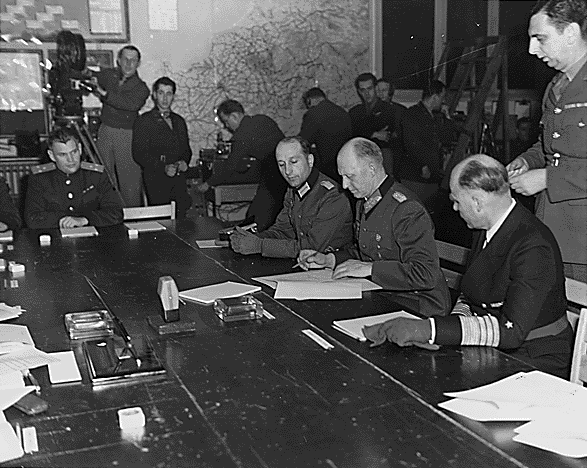Berlin: One-Time Holiday for VE-Day Posted by Sten on May 8, 2020 in Culture
Today is VE-Day, or Victory in Europe Day. May 8, 1945 marks the day that the Nazis capitulated. With the Nazi regime gone, it was Stunde Null (Zero Hour), as it was called, for Germany: The opportunity for a new Germany, starting over. In Berlin, its 75. Jahrestag (anniversary), the day is a einmaliger (one-time) Feiertag (holiday). What happens today?
Kapitulation am 8. Mai 1945
On May 7, 1945, the highest command of the German Wehrmacht signed the Kapitulation (surrender) in Reims, France. The official time of Kapitulation was set at May 8, 11.01 pm, Berlin time. For the allied forces, it officially marked the end of World War 2 in the European theatre. The Japanese capitulation only came on September 2, 1945.
For Germany, it is also seen as a Tag der Befreiung (liberation day) of the Nazis, but it is not celebrated, like in other countries like the Netherlands1The Dutch also have a day for commemoration, but that is a day earlier on May 4., but rather commemorated. However, while in many other places, it is a regular Feiertag, it is a regular Arbeitstag (work day) in Germany. Only this year, Berlin gets a long weekend, with VE-Day being a Feiertag.
In Berlin, this day has more of a history, however. In 1985, the 40th anniversary, it was already a Feiertag for East Germany, with parades and commemorations of the Red Army that got all the way to Berlin in 1945.
The last days of the Third Reich
https://www.youtube.com/watch?v=l2rDOjaPYqk
DW made a good documentary about the last days of the Nazis, and what led to the Kapitulation. You can watch it in English above, or in German at this link.
Gedenkfeier in Berlin
Of course, today was also a Gedenkfeier (commemoration) to the end of the war. It was held in Berlin. Many youth from all over were invited, but due to the Coronavirus restrictions, could not come. The Gedenkfeier was attended by only a few people, including Angela Merkel.
Bundespräsident (President of Germany), Frank-Walter Steinmeier, gave a speech. I want to quote one sentence from his speech that I think strikes at something fundamental about modern Germany that persists to this day:
“Wir wollen […] gemeinsam mit all denen auf der Welt, die diesem Land die Chance gegeben haben, neu anzufangen, […] hier heute erinnern.” (Together with all those in the world, who have given this country the chance to start again, we want to commemorate here today).
The lack of national pride of Germans is related to shame of what happened between 1933 and 1945. And back then, there were ideas of eradicating Germany entirely, to simply give the entire German territory to neighboring countries. But that did not happen, quite the opposite. Only 3 years after Stunde Null, Germans got the chance to redeem themselves in a new democratic Bundesrepublik (Federal Republic). Connected to that was a feeling of responsibility to never let something like that happen again. And this was achieved through acts of denouncing the Nazi regime and its ideology entirely, and by becoming proponents of European cooperation, not hostility.
- 1The Dutch also have a day for commemoration, but that is a day earlier on May 4.

Build vocabulary, practice pronunciation, and more with Transparent Language Online. Available anytime, anywhere, on any device.





Comments:
Art Rutherford:
Hallo Sten,
I’m in the USA learning German; and I’m a WWII buff.
Sehr Gut on the film. Danke.
Art 🙂
Sten:
@Art Rutherford Glad you enjoyed it!
There are a TON of German WW2 documentaries, perhaps also with (English) subtitles. I know ntv and Spiegel have a lot of articles and videos on this.
With history, I always like to go between languages. Every culture gives its own perspective and wording to a time and place in history!